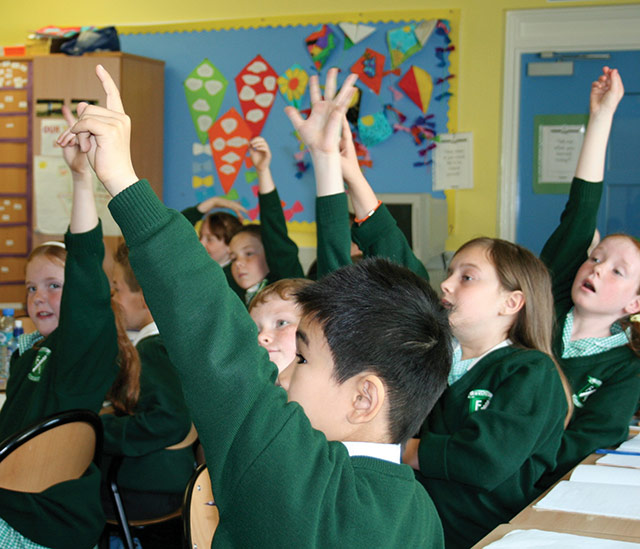Language barrier


A recent report prepared by academics in Stranmillis University has recommended that learning a second language should be made a compulsory element of the Northern Ireland Curriculum for primary school students.
The report commissioned by the Northern Ireland Languages Council was based on growing awareness in Northern Ireland of an emerging deficit in modern language skills and transferable skills. First recognised in the UK, it is widely accepted that Northern Ireland’s economic growth depends highly on the growth of its export base, of which linguistic expertise is a critical factor.
In Scotland and England the social, economic and cognitive benefits of learning an additional language has been recognised and coupled with studies to show that younger learners display greater capacity for successful learning, it was implemented as a statutory part of the Curriculum in primary schools. In Northern Ireland, implementation stopped short of being deemed statutory, instead implementing the Primary Modern Languages Programme (PMLP). The programme supported primary schools to teach Spanish and Irish and later, to a lesser extent, Polish and it was reported that just over half of primary schools in Northern Ireland availed of the programme. When compared to the rest of Europe, where in 2013 more than 80 per cent were learning an additional language, Northern Ireland and Wales are the regions with the shortest period of compulsory foreign language learning.
The ‘Review of Current Primary Languages in Northern Ireland’ was carried out in the context that the PMLP came to an end in 2015 due to Department of Education cutbacks and took in extensive views from a broad range of principals, teachers and pupils in both PMLP and non-PMLP schools.
Importance
There was a broad consensus among school principals and teachers, both those who took part in the PMLP programme and those who did not, that additional language learning was “important, valuable and enjoyable” for pupils and the majority agreed that it should be a statutory element of the Curriculum. They also agreed that offering an additional language raised the profile of their school in the community. However, the report indicates that its questionnaire survey response rate, a focus on literacy and numeracy and the end of PMLP suggest that not all principals and teachers see the inclusion of an additional language as a priority and as a result the fact that additional language opportunities are not open to all pupils “highlights a lack of equity in provision for children in Northern Ireland’s primary schools”.

Provision
Under PMLP, Spanish was the most frequent language taught to primary schools in Northern Ireland but some schools outside of PMLP also offer French, German and Mandarin. A variation occurred whereby most teachers in PMLP schools did not have teaching qualifications but the opposite was the case for non-PMLP schools. A similar variation was found when comparing the Key Stages in which schools offered additional language study with PMLP schools focussing on Foundation and Key Stage One, and the majority of non-PMLP schools focussing on Key Stage Two.
In terms of time constraints and resources, additional language learning being made statutory was deemed essential. Principals and teachers recognised a need to build on pedagogical and linguistic expertise of class teachers but expressed concerns that there currently didn’t exist an element of continuity and progression across the Key Stages.
Pupils who took part in the study found additional language learning “enjoyable, challenging and useful” and most believed it should be an opportunity offered to all children. While French or Spanish was the most popular option for children within the study, there was also desire for a wide-range of European and non-European languages, including German and Mandarin.
Source: Review of Current Primary Languages 2017.
Recommendations
- The inclusion of additional language learning as a statutory part of the Northern Ireland Curriculum to afford the opportunities of additional language learning to pupils in all primary schools thus addressing concerns around equity.
- The development of levels of progression and other appropriate curricular and cross-curricular guidance for teachers and schools.
- The development of age-appropriate resources, including e-resources, to support additional language teaching in primary schools.
- The development of a funded specialist qualification in Primary Education with modern languages in Initial Teacher Education.
- The development of funded modern languages support in Continuing Professional Development for teachers in collaboration with Initial Teacher Education providers, the Education Authority, and NICILT.
- Further funded research into flexible, cross curricular approaches to modern language learning such as CLIL (Content Language Integrated Learning) and STEM-L (Science, Technology, Engineering and Mathematics with Languages), in order to address concerns raised about space for foreign languages in the primary school timetable.
- Further funded research into possible models of collaboration between schools both at primary level and between primary and post-primary schools to ensure progression in learning and to promote a positive transition between Key Stages 2 and 3.
- More effective area-based planning to ensure better linkage between the languages offered in primary and post-primary schools.





